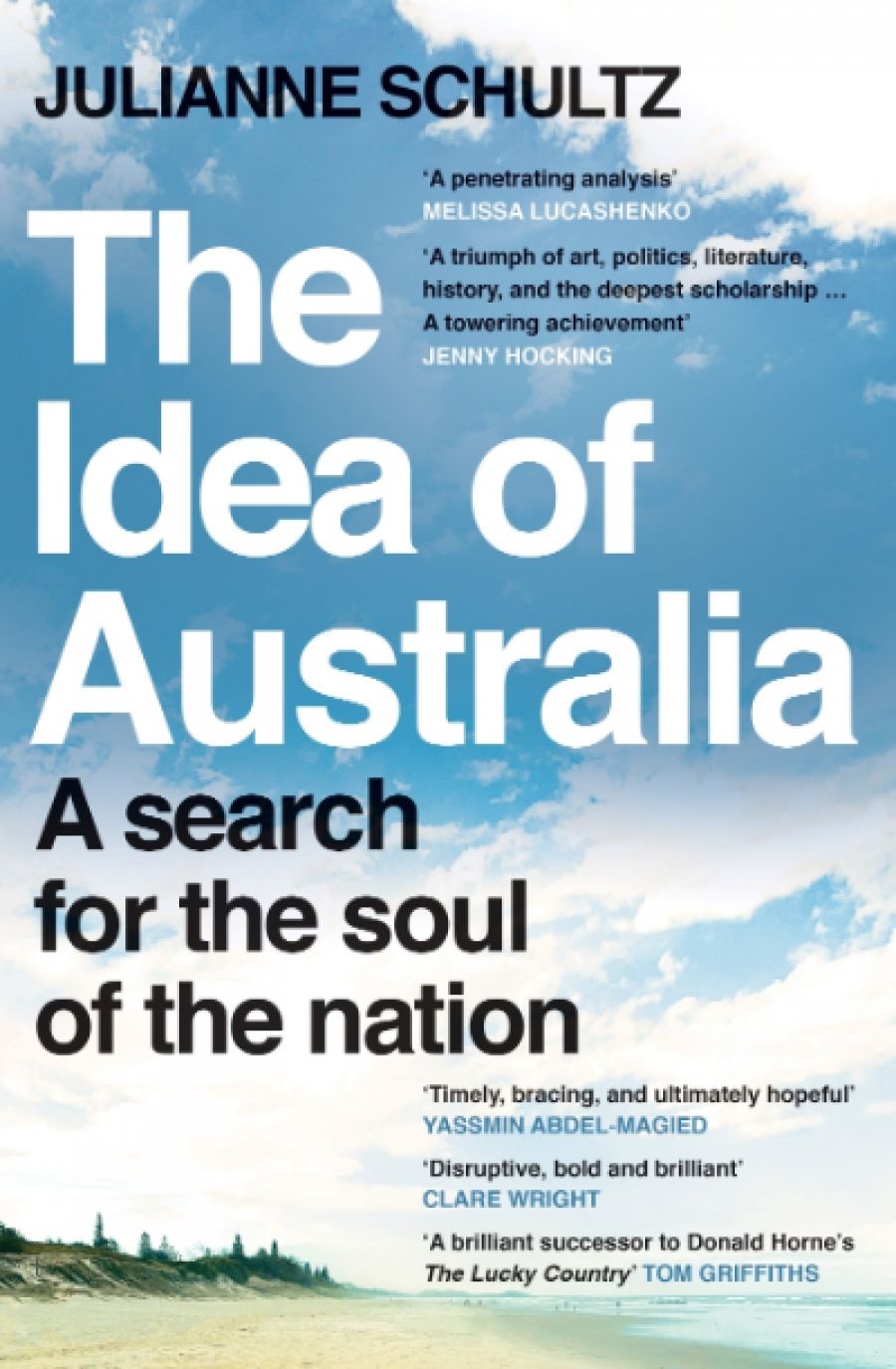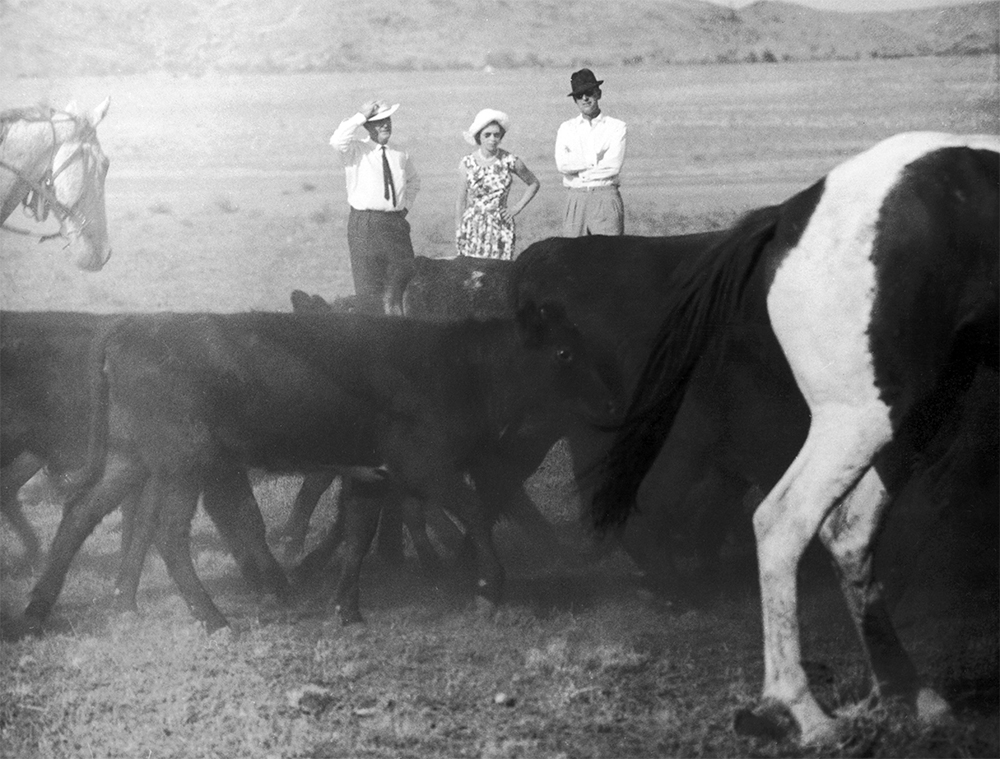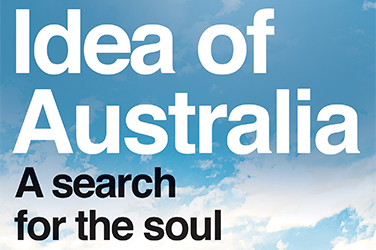
- Free Article: No
- Contents Category: Society
- Review Article: Yes
- Article Title: The figure in the carpet
- Article Subtitle: The stories we tell ourselves
- Online Only: No
- Custom Highlight Text:
A new monarch succeeded the day I sat down to write this review about the idea of Australia. Prime Minister Albanese, in a blessedly unpoliticised speech about Elizabeth II’s death, was direct in announcing that he and the governor-general would be heading to London, ‘where we will meet the king’.
- Article Hero Image (920px wide):

- Article Hero Image Caption: The queen and the duke of Edinburgh watching stockmen round up cattle near Alice Springs, 1963 (Trinity Mirror/Mirrorpix/Alamy)
- Alt Tag (Article Hero Image): The queen and the duke of Edinburgh watching stockmen round up cattle near Alice Springs, 1963 (Trinity Mirror/Mirrorpix/Alamy)
- Featured Image (400px * 250px):

- Alt Tag (Featured Image): Robert Phiddian reviews 'The Idea of Australia: A search for the soul of the nation' by Julianne Schultz
- Book 1 Title: The Idea of Australia
- Book 1 Subtitle: A search for the soul of the nation
- Book 1 Biblio: Allen & Unwin, $34.99 pb, 472 pp
- Book 1 Readings Link: booktopia.kh4ffx.net/DVvWyj
Ours is an independent nation that was federated under a British imperial monarch in 1901; a European nation in Southeast Asia; a nation of migrants from many lands, dominated by the institutions and concerns of the Anglosphere; oh, and the land where the oldest continuous cultures persist after 60,000 years. It can be a bit confusing.
No single idea of Australia can weave a golden thread through this mess, and Julianne Schultz knows it. In this generous-minded book, she thinks more historically than analytically about who we are in the light of the X-ray of the nation provided by the pandemic. Her Australia is the overlapping and inconsistent stories that we tell of ourselves, rather than some integrated identity that can be distilled. ‘The idea of Australia, like the idea of a life, is as much shaped by the silence as the stories we tell ourselves and the institutions we create.’
This is wise and leads to a capacious book where each chapter fugues on a consistent set of themes carried through particular stories of conflict and belonging. You could read any chapter in isolation, but the whole adds up to more than the sum of the parts. A persistent motif is the rise and fall of hope – hope that we can as a nation live up to the egalitarian and cosmopolitan ideals implicit in Federation and the nationalism of the post-Whitlam era, modulated with fear that we will lapse again into another phase of thin instrumentalism as the ‘Lucky Country’. Too often, we dodge the big issues to dig another mine, reap another windfall, ignore a bunch of injustices, and let tomorrow look after itself.
The Idea of Australia appeared in March, in that period of jittery uncertainty when some hoped and others feared that Paul Keating’s prophecy – ‘When you change the government, you change the country’ – would be re-enacted. The government has indeed changed, and we seem finally to recognise that the answers of the 1990s no longer fit the pressing questions of the 2020s. Public health, it appears, can outrank economic activity. The market cannot provide affordable housing for all. Workers have woken from the long post-Oil Shock nightmare to discover that they are now the scarce commodity, with serious bargaining power. That whispering in our hearts about the land – who owned it before European invasion; how it will not abide the endless environmental degradation we visit on it – will not be silenced.
Schultz wants a big Australia morally, not just economically, one that recognises the damage of white invasion both culturally and environmentally, one that fosters talent in everyone, not just the traditional pool of ‘bright young men’. Though she resists the ground game of political biffo, it is clear that the most cunning villain in her story is John Howard, whose genius idea that a majority of Australians would choose comfortable and relaxed over cosmopolitan and striving lies at the root of the new millennium’s missed opportunities. ‘As prime minister, he would claim the old myths, strip them of their collectivist ethos, contest uncomfortable history and turn red voters blue.’ Stripped back to the marketing minimalism of ‘How good is Australia?’, this line of individualism of the fittest expired in the May federal election. What will take its place?
If Schultz is our guide, it will not be a rootless cosmopolitanism or a black armband view that denies any real achievements since Arthur Phillip landed at Sydney Cove. No book I have read understands the regionalism of this country’s cultural life so instinctively. She writes luminously of Stradbroke Island, Western Victoria, and Sydney’s inner east as places with layered histories of human endeavour. The different media worlds of 1980s Brisbane and Melbourne come alive with a compelling sense that only in these places can normal business practice look quite as odd as they did. We have attachments to beaches, suburbs, country towns; to religious traditions and football codes; to homelands as distant as Galway and Guangzhou, or as nearby as the Kaurna lands on which I write.
We are, like other nations, shaped by many shared experiences and concerns, and separated by many differences of region, class, race, and gender. Only knaves, fools, and marketing gurus try to tell us that we are one. Schultz thinks we are ready for a richer and more complex idea of Australia than that.
Near the end, she quotes Nick Cater in The Australian, who condemns ‘woke’ as ‘the biggest threat to liberalism, Australia’s riding philosophy since European settlement’. As a diagnosis, it is ridiculous; ‘woke’ is a noise in the culture wars which thrive as an alternative to making serious material decisions about scarce resources on a finite planet. But the assumption about liberalism as bedrock is worth dwelling on. It reminds me of Mahatma Gandhi’s response when asked about Western civilisation: ‘I think it would be a good idea.’ A properly liberal Australia, with opportunity, respect, responsibility, and protection spread equally among the twenty-five million inhabitants of the big and little islands – how good would that be?
For Schultz, a liberalism like this is not so much a utopian dream as a historical one. It would be the consequence of the best bits of our past: the constant task for making a fairer, kinder, wiser, and more genuinely prosperous country. But to reach this goal we have to unpick the figure in the carpet of settler Australian culture. In its bluntest form, this is the idea of ‘Australia for the White Man’, a prolific motto in the decades either side of Federation, only removed from the banner of the Bulletin as late as 1961. Less a figure in the weave, that attitude is more like the stench of stale beer in the carpet of a country pub. Renovations and deep cleaning can banish it for a time, but it always returns. The real Australian is an Anglo bloke who reckons everyone like him deserves a fair go, while others should wait in an orderly and allegedly meritocratic queue – to get into the country, to get the senior jobs, to regain rights to their land.
Around the time of Federation, Australia did become something of a working man’s paradise, as long as you were a man, and white, and working. This real and liberal achievement was not then extended to women, or First Nations people, or migrant men unless they were from the right place and assimilated nicely. Schultz, as a woman who has often butted her head against the glass ceiling, reckons it is time to break the grip of paternalistic she’ll-be-rightism and ‘address the structural factors that as a nation and as individuals, prevent us from realising our potential’.
Let us mark the reign of Charles III, the embodiment of mediocre white patriarchy, by giving that one a red-hot go.


Comments powered by CComment